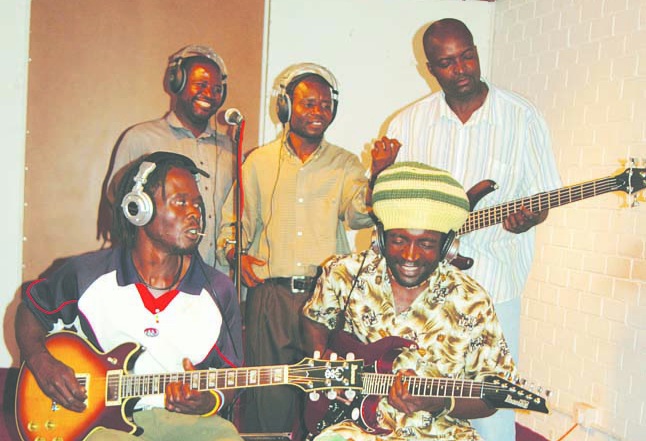“Ndega Ndega”, Pengaudzoke (1994)
The boys, Daiton Somanje, Josphat Somanje, Clever Somanje, Innocent Nyawani, Lameck Fadwick, Marefura Ngolowela and Laisan Ngolowela had everything in common in their Chitown quarters. The first bandmate to get married even stayed with his wife in the same room with the rest of the band.

Ndega” (1994) is the first Pengaudzoke album where Josphat Somanje is lead vocalist for the better part of the LP. About a decade earlier, the intoverted guitarist had recruited his older brother, Daiton, into his band, looking to get a more natural frontman. Daiton had led the singing on three albums, “Takabva Kure neNhamo” (1989), “Midzimu Yangu Muchandipei” (1990) and “Pengaudzoke Zvekare” (1991). As the boys were recording their 1992 hit album, “Seiko Kuonda”, royalties came in for previous albums. As it turned out, there was a composer’s fee,10% of the band’s earnings, put aside before the rest was split among all band members.
At the time, the boys stayed together in Chitungwiza. Josphat had initiated the move from the Dhinota Farm, near Beatrice, to Unit N. Mr John Somanje, father to Pengaudzoke boys, Daiton, Josphat and Clever, had recently retired from the farm and settled in the rurals. He had favored Josphat to take over from him, and arranged for the young guitarist to receive his pension and take care of 14 siblings, less a few who died young.
Farm managers told Josphat he was now officially a farmhand in place of his father, something he would have been already familiar as he used to wake up 3AM to weed his allocated lines as a condition for attending his classes for the day at the farm school. Daiton, possibly other siblings as well, had left school early to work at a nearby farm, while more than half the band were teenagers at the time of the first Pengaudzoke recording under the tutelage of Oliver Mtukudzi who was scouting farm and mine bands for RTP alongside Ray Makahamadze and Patrick Mutume (all late). For the family to continue on the farmstead, Josphat had to inherit his father’s job.
The guitarist took a gamble. He refused the farmhand job, gave up the family’s corner of the compound as such, and used his father’s pension to secure one room for seven band members in Unit N. The boys, Daiton Somanje, Josphat Somanje, Clever Somanje, Innocent Nyawani, Lameck Fadwick, Marefura Ngolowela and Laisan Ngolowela had everything in common in their Chitown quarters. The first bandmate to get married even stayed with his wife in the same room with the rest of the band.
So now, the money comes in, $810, for their early efforts. Daiton naturally the composers’ fee, even if few of the songs, “Kufambafamba”, “Kana Toronga”, “Ndatenga Hembe” etc on the hardship of farm life and the elusive importance of education had been written by Josphat, who had also forfeited composers’ credit as he wasn’t build like a frontman.
Daiton used his exclusive percentage for bride price, while Josphat unfortunately lost a son around the same time, the first of few children to die in infancy before he finally lost his wife. Josphat asked Daiton for financial assitance after the death of his first child but received none, perhaps because the money was already the business of the in-laws. So the first time the band was existentially threatened by money-themed squabbles was 1992, during the “Seiko Kuonda” album cycle. At some point, Josphat left the band and to tag along other farmhand rockstars that were finding their feet in Harare, although he never joined. “Seiko “Kuonda” outdid all the previous albums and saw the boys come together for their next album, which would have been “Sakunatsa Sakubaiwa” or “Ndega Ndega” (records are currently sketchy).
Come “Ndega Ndega”, Josphat took over the vocals for the first time. Still in mourning, the message was pointed, “Ane vana vake anorera ega.” The album marked the end of collective accommodation and depending on each other for family responsibility. Another song was, “Mwana wangu waenda ka, kushaya mari kwandipinda, amai,” also mourning his son. “Mafaro Panyika” ascetically renounced worldly pleasures, all of which marked a new version of Pengaudzoke, laid-back, with guitarists skillfully adapted to match their arranger’s lower vocals.
The younger Somanje went on to earn his fair share of Pengaudzoke classics, including “Titonganisei,” recorded after even more squabbles in the early Pengaudzoke. As a matter of course, the brothers now composed and led vocals on alternating albums.



Leave a Reply